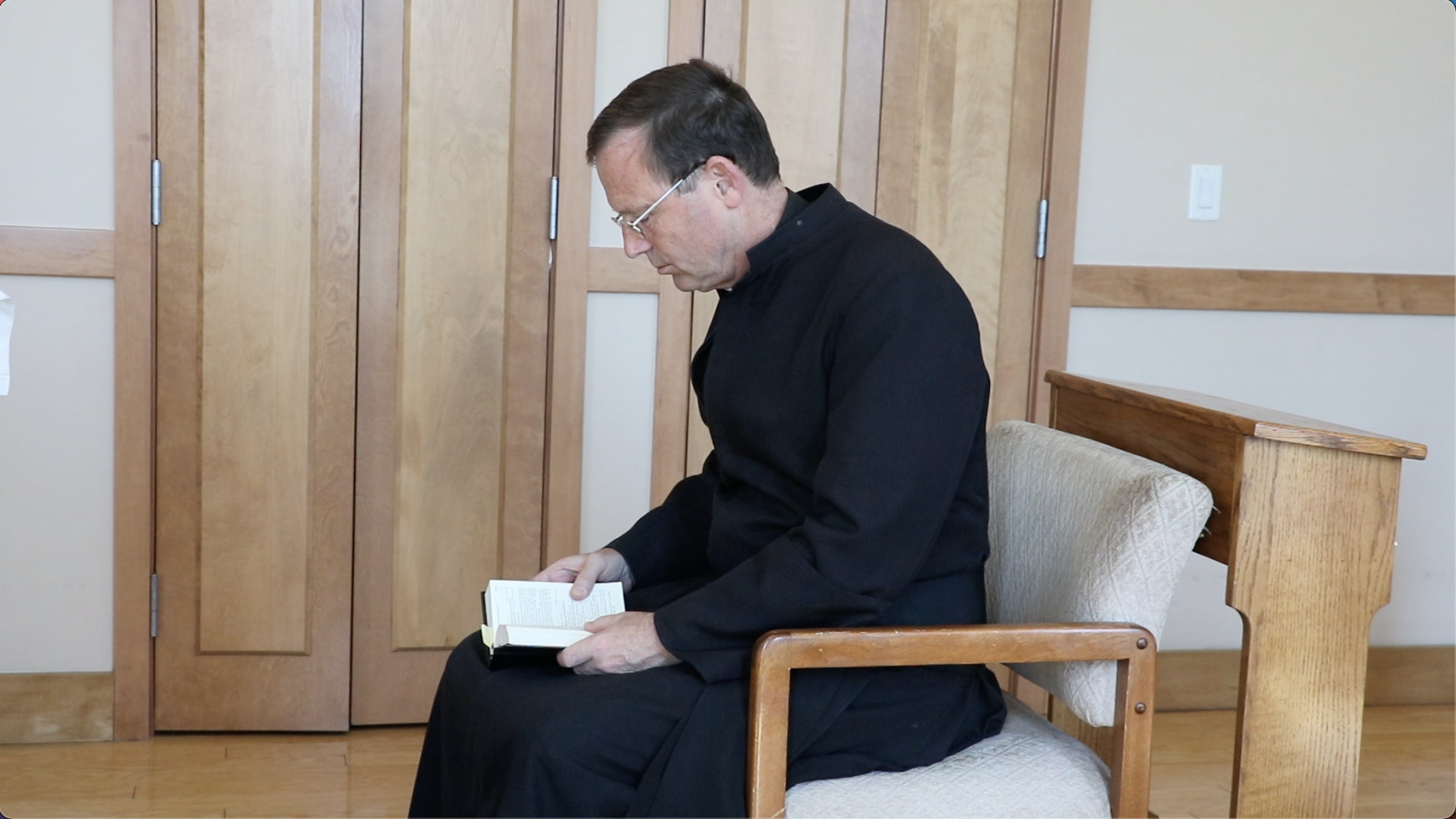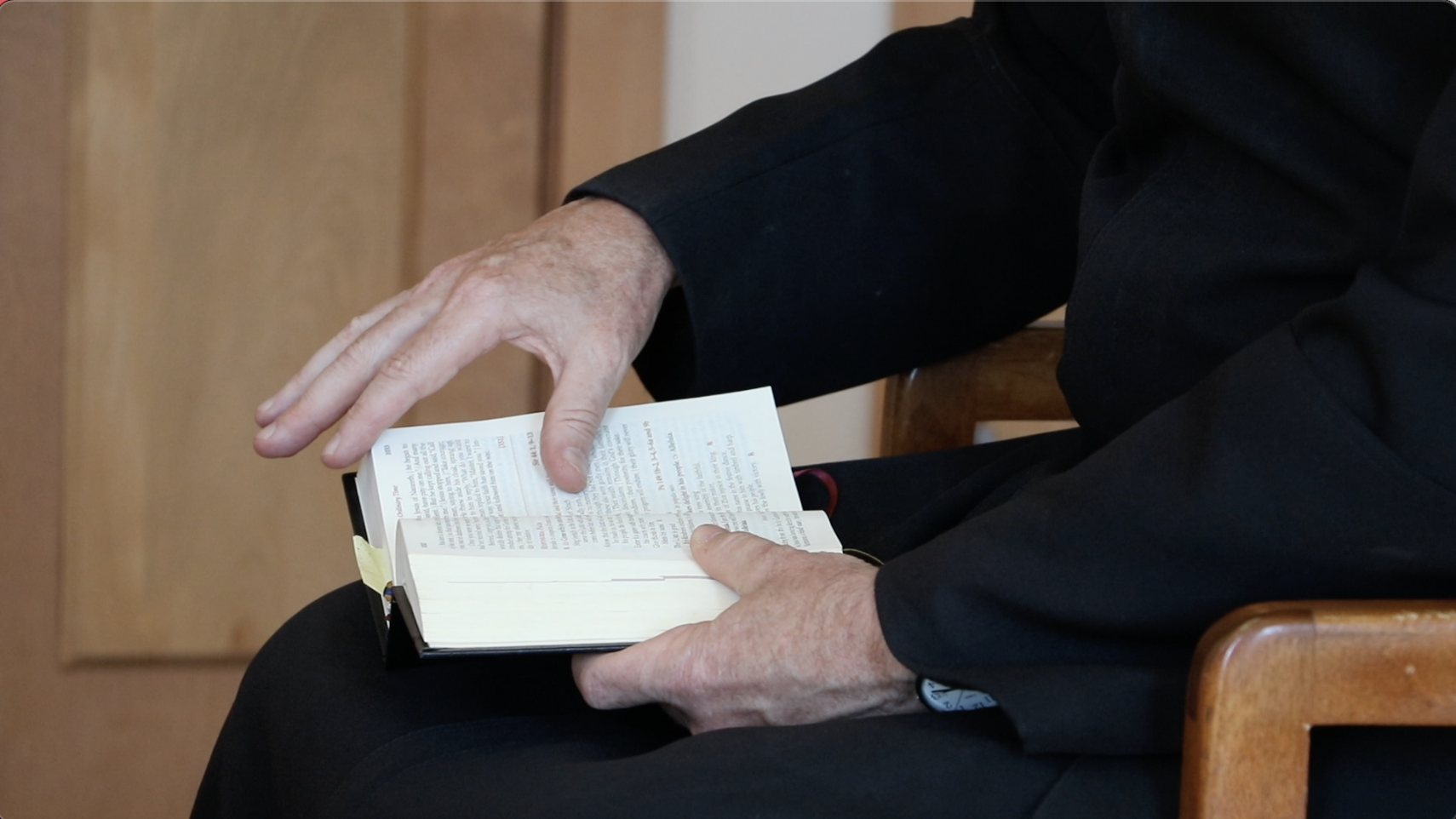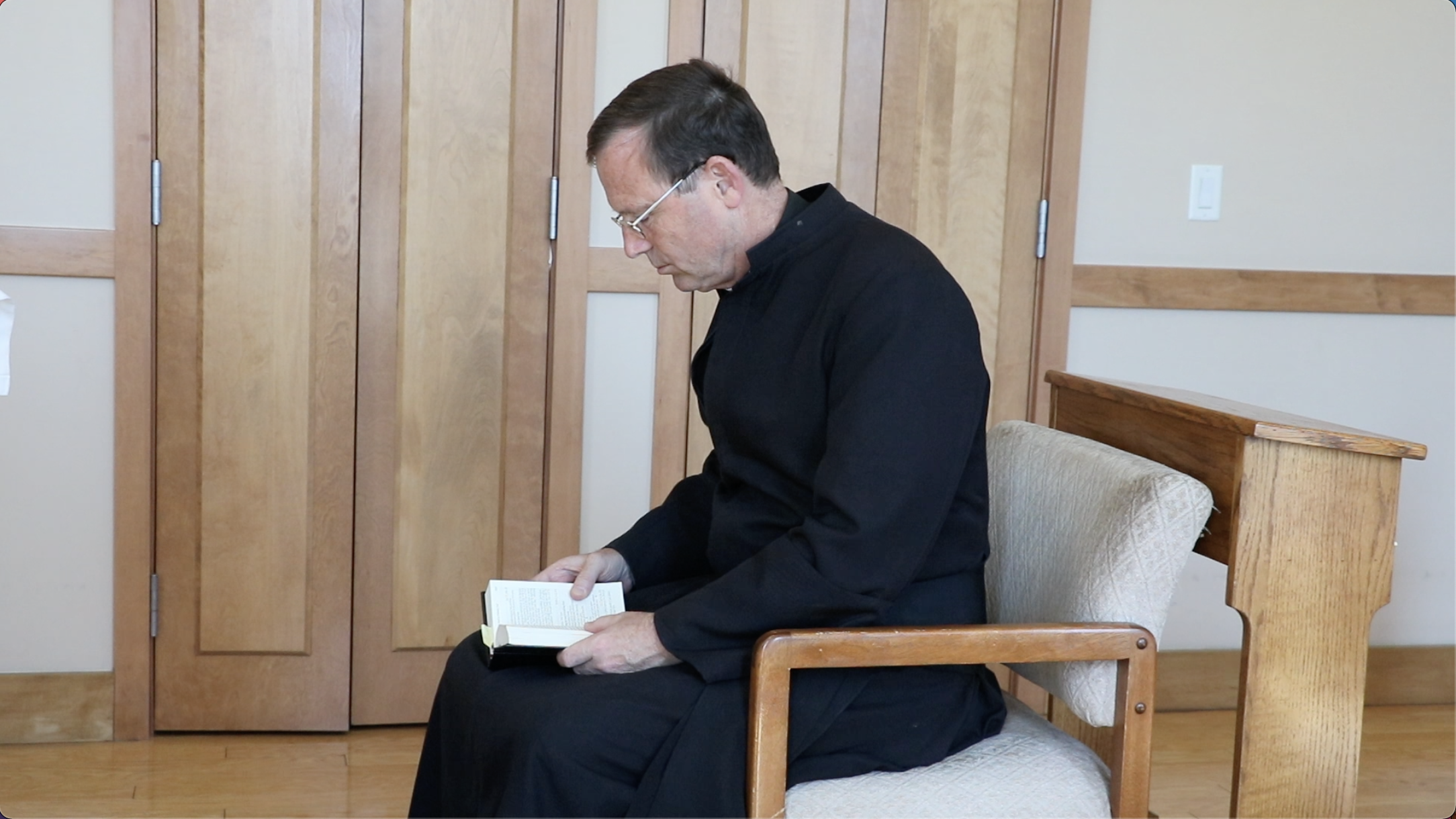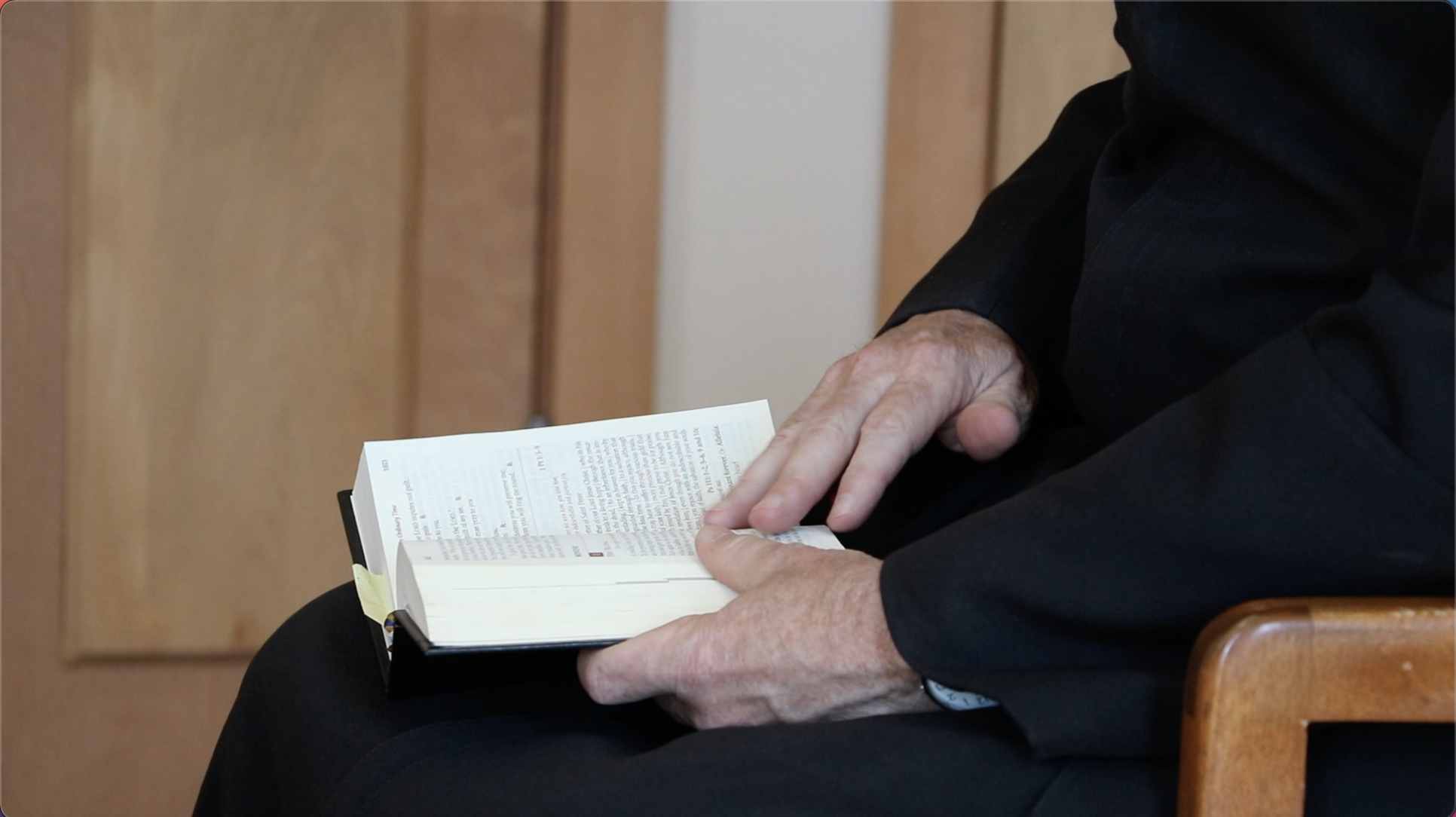
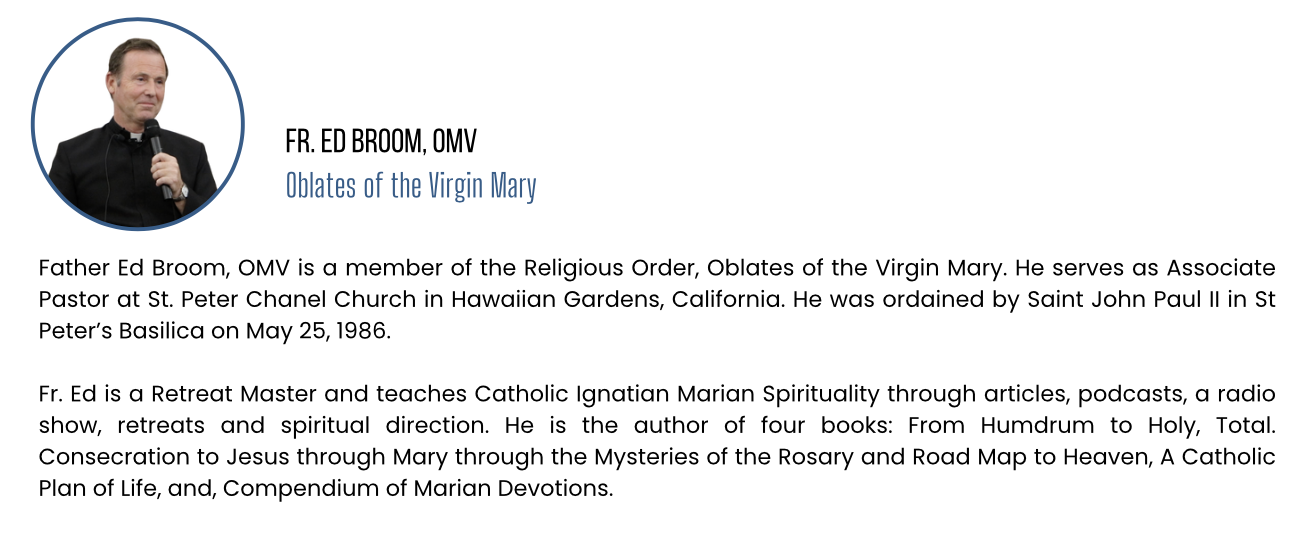
The name of the Father, Son and Holy Spirit, amen. I’d like to welcome you to our Perseverance family conversation. I’m Father Ed Broom, Oblate of the Virgin Mary, your friend and your host in this Perseverance family conversation we have every morning. Great to be with all of you!
I would like to start off our conversation by inviting Mary to be with us. Mary has many wonderful titles. Mary is the Mother of God, Mary is the Mother of the Church, Mary’s the mother of each and every one of us. Also turn to Mary and invoke Mary from the Hail Holy Queen, Mary is our life, our sweetness and our hope! That’s true, Mary, is our life, our sweetness and our hope!
Let’s ask Mary to pray with us, and to pray for us in this beautiful month of May dedicated to Mary. May is for Mary! Let us pray: Hail Mary, full of grace, the Lord is with thee, blessed art thou among women and blessed the fruit of thy womb Jesus. Holy Mary, Mother of God, pray for us sinners, now and at the hour of our death. Amen.
Now I’d like to invite to be with us our Spiritual Director. Our Spiritual Director is the Holy Spirit. The Holy Spirit has many wonderful titles, the Holy Spirit is the Paraclete, Holy Spirit is also from the Catechism of the Catholic Church is also the Gift of gifts, the Holy Spirit from the Sequence that will be praying on Pentecost, the Holy Spirit is also known as the Sweet Guest of our soul. The Holy Spirit is also known as our Consoler. He’s the one that can help this, help us to get out of desolation. Holy Spirit is also known as Our Counselor. And the Holy Spirit is our Interior Master. Saint Paul says that we really don’t know the prayers we ought but the Holy Spirit intercedes with ineffable groans so that we can say “Abba” which means Daddy, or “Father”.
Let’s beg the Holy Spirit, God’s gift to us, to give us a lot of light in our intellect and set our hearts on fire with love for Him. As we pray: “Come Holy Spirit fill the hearts of your faithful and enkindle within us the fire of your divine love. Send forth your spirit and they shall be created and thou should renew the face of the earth. Let us pray. Oh God who did instruct the hearts of your faithful by the light of the Holy Spirit, grant us that by the same spirit we may be truly wise and every choice in his consolation to the same Christ our Lord, Amen.
Glory be to the Father and to the Son, and to the Holy Spirit, as it was and beginning is now and ever shall be, world without end. Amen. Our Lady of Fatima, pray for us. St. Faustina, pray for us. Saint Michael the Archangel, pray for us. St. Gabriel, pray for us. Saint Raphael, pray for us. Saint Gregory, pray for us. St. Beed, pray for us. St. Mary Magdalene de Patsy, pray for us. All God’s angels and saints, pray for us! In the name of the Father, the Son, the Holy Spirit. Amen.
I’d like to welcome you all to our Perseverance family conversation and as always, I will be praying for all of you in the Holy Sacrifice of the Mass. The Holy Sacrifice of the Mass is by far the greatest of all prayers. It is a prayer, par excellence, the Holy Sacrifice of the Mass. I’d like to place you all on the altar and I would like to offe the following intentions.
INTENTIONS FOR TODAY
First I’d like to pray for all of us that we would be open to the inspirations of the Holy Spirit and perhaps we can say during the course of the day: “Come, Holy Spirit, come. Come, Holy Spirit, come through the heart of Mary. Come, Holy Spirit, come. Come, Holy Spirit, come through the heart of Mary”. My next intention, I’d like to pray for our families especially the conversion of our families. For the family members who have walked away from God. Family members who don’t go to church. Pray also for our own conversion, because conversion is not simply radical conversions, but also daily conversions. Let’s pray that we would go deeper in our own conversion on a daily basis.
Next intention: We could pray, my friends, in a special way for those who be dying today. Especially those who are not prepared for this all-important moment in their lives. Let’s pray that those who are dying would open their hearts to God’s infinite mercy. Jesus said: “What would it profit a man if he gains the whole world and loses his soul in the process”? Pray that those who are dying would open up their hearts to God’s infinite mercy, indeed His mercy is infinite. Give thanks to Lord for he is good, for his mercy endures forever.
MARIAN REFLECTION
So, in this month of May we’re giving a brief Mary reflection at the beginning of our conversation. The Marian reflection I’d like to offer today is consecrate one’s family to the Sacred Heart of Jesus and to the Immaculate Heart of Mary. Maybe you will not do this overnight. But I think it’s a great idea to consecrate yourself to the Sacred Heart of Jesus and to the Immaculate Heart of Mary. Here’s your beautiful image of the Immaculate Heart of Mary. Perhaps you can say that prayer, ‘sweetheart of Mary, be my salvation. So let’s return my friends to the Acts the Apostles.
ACTS OF THE APOSTLES
I’d like to kind of give you an overall summary of what St. Paul has been doing. Rewinding the film of the life of Saul of Tarsus, Saul was persecuting the first Christians and he was throwing them into prison. One of the most prominent moments of the Acts of the Apostles chapter six and seven we have the person of Saint Stephen. Steven is preaching the Word of God, he’s eloquent, he’s convicted, he’s strong and he is condemned to death. As he’s being stoned to death Stephen is forgiving his persecutors. Saying, “Lord, do not hold this sin against them, Father, into your hands, I commend my spirit”. Who is present there is the person of Saul of Tarsus. Saul of Tarsus concurred with the death of Saint Stephen. Shortly after that after pursuing the early growing Christian he’s heading toward Damascus. On his way toward Damascus, he surrounded by bright light, and he hears a voice, “Saul, Saul, why are you persecuting me”? “Saul, why are you persecuting me?” “Who are you, Lord”? “I’m Jesus, who you are persecuting”. Saul is blinded by this bright light and he falls to the ground, his companions take him by the hand. Saul is blind and doesn’t eat anything for three days and three nights. God speaks to Ananias, an early follower of Christ, and God tells Ananias to go to Straight street where Saul of Tarsus is, Ananias objects, but the Lord points that I have chosen his Saul as his special vessel. “I will point out to him how much he’ll have to suffer for my name”. So Ananias obeys the Word of Jesus Christ, who speaking to him and Ananias then goes and he places his hands on Saul. Something like scales fall from his eyes and Saul is able to see. Saul’s baptized, given something to eat. And this, my friends, is one of the most radical conversions in the history of the world. Perhaps the most famous conversion in the history of the world. Saul of Tarsus, who was dragging Christians into jail, putting some of them to death, was present at the death of Saint Stephen, now has an encounter on the road to Damascus with Christ. He’s baptized and there’s a radical change in his life.
Paul gets up and he preaches in the synagogue that Jesus Christ is the Son of the living God. This note my friends, let’s pray for conversion of the world. Let us pray for the conversion. Let us pray for the conversion of Catholics. Let us pray for the conversion of our church. Let us pray for the conversion of our family, which is the domestic church. Let’s pray for our own conversion. Saint Bernard once commented that it’s easier to see someone undergoing a radical conversion from sin to grace than to see someone going from going to better in their spiritual life. Saint Bernard is pointing out that we can have a tendency in our lives to stagnate. Our spiritual life, my friends, is a call to daily conversion. If you’re rolling your boat and you don’t row against the current, you’re going to be dragged downstream.
Saul goes this radical conversion, he’s baptized by Ananias, and he preaches in the synagogues. He will experience persecution. So note for all of us: You should not be surprised that if you are living out your Catholic faith that you experience some type of persecution, you should not be surprised.
Jesus preached that in the Sermon on the Mount there are 8 Beatitudes. The last of the Beatitudes Jesus says: “Blessed are those are persecuted for my name, for theirs is the Kingdom of God”. We’re talking about the presence of Saul and Paul in the Acts of the Apostles today.
We’re seeing how God is working in this great man and we’re trying to apply this to our own lives. We shouldn’t be surprised. And if we enter called persecutions in our own lives? And often the persecution in our own home, our spouse or children don’t seem to understand us. They think that we’re religious fanatics. They think we’ve gone overboard that we’ve gone over the top! They think that we’ve lost our common sense. They really feel that we’re going crazy. They really believe that we are not really living in the world. I think most of you have experienced that type of a persecution.
So going back to Paul, Paul is converted. Paul will separate himself and go to Arabia for several years. Where the Lord will speak to him, Paul comes back and is united with the apostles and Paul is sent on a missionary trip. In his first missionary trip he goes with Barnabas who’s known as the son of consolation and he goes also with John Mark, who wrote the second Gospel. Matthew, Mark, Luke and John.
On this journey, something happened, such that John Mark abandoned Paul and Barnabas. Paul was not happy over this such that the next time that they would go off on the missionary trip, Barnabas wanted to take Mark, who was actually his cousin and Paul said no! Because John Mark had abandoned him the first time. He will not come with us! There was a dissension and Barnabas decided not to go with Paul. Now, fast forward, we see the presence of. Saint Paul.
Most of the second part of the Acts of the Apostles, known as the Gospel of the Holy Spirit. We see a good part of the Acts presenting Paul the Great Apostle, Saint Paul the Great Missionary! But what has happened in Paul is the following. God is going to use him to carry out an extraordinary mission within the Church. Often, he’ll be preaching to the chosen people, the children but more than once, they don’t accept this preaching and they persecute him. Paul is going to be persecuted in many ways, in one of his writings he gives us a list of his persecutions: he was beaten with rods, shipwrecked, thrown in jail. There’s a whole litany or list of the many sufferings that Saul, rather Paul would undergo for the sake of the name of our Lord. But once He was converted, his love for Jesus Christ was so strong that nothing can stop preaching from Lord’s everything.
The very life of Saint Paul, which is we should pray for that grace. Pray for the grace that Jesus Christ will be the very center of and the Principle is Foundation of our lives, the beginning and the end! That Jesus will be the Way, the Truth, and the Life, He’ll be our rock foundation, our everything.
Paul was actually a Pharisee. Paul decides that he will go because of the persecution, the beating, stoning, the scourging, the rejection of Saul, of Tarsus. Because of this God is speaking to Paul in a very powerful way, saying that now you will be called to preach the Word of God to the whole nations, and that is what he did.
Paul would go and preach the Word of God to the whole nations and the world, ‘Catholic, Kata Holos’ in Greek, and it actually means, universal. That Paul would preach the word of God to all the nations. Paul then goes to Antioch to preach to some of the Greek speak people because he also could speak Greek. He stayed there and many converts came about through this. Paul is going to go to Antioch and he’s going to be going to many places. He’ll go to Athens, He’ll go to Galatia, He’ll go to Corinth, where you spent a couple of years. He’ll go to Ephesus where he spent a couple years. He will go to Jerusalem, where he’ll be thrown in prison. He’ll go to Rome. Saint Paul is on the move, so one of the points I just like to highlight for all of us. Saint Paul, obviously after Jesus Christ, was perhaps the greatest missionary in the Catholic Church, he could not keep the love of Christ within it. It’s so true, even in our lives one of the best ways for us to grow in our faith is to share our faith with others. That’s right! One of the best ways to grow in our faith is to share our faith with others. Now what he would do? Paul would go to a place, he would preach, and there would be converts, then after preaching that there be converts, then he would ordain priests, also known as presbyters. These priests or presbyters Would preside over the church. Then Paul would write letters to them.
Today we have Paul, who’s. Paul, who is in prison, in Jerusalem, and he’s brought before the court, and beforehand you have two different two different groups of Jews. You have you have the Pharisees and you have the Sadducees. And Paul opens up his mouth and the Pharisees and Sadducees did not agree on many things, even though they were Jews. Pharisees believed in the immortality of the soul, they believe in angels, they believed in the resurrection. The Sadducees didn’t believe in any of that. So Paul spoke up and there was such a disagreement among the Pharisees and Sadducees that they wanted to kill Paul.
There is a fear that he’d be torn to pieces, so the Roman guards go and they take him to the compound, where he is thrown in jail. Jesus once again speaks to Paul and says, “do not be afraid as you’ve given witness in Jerusalem, you will give witness to me in Rome”: So Paul will be transported, he’s going from Athens to Corinth, from Corinth to Jerusalem, Jerusalem to Rome. He’s moving from one place to the other.
HUMILITY
I’d like to comment briefly on what Saint Paul said this would be going back to yesterday, I thought a very pertinent. Some of the advice that he gave to the church in Ephesus, he says this: “You know how I lived among you the whole time, from the day I first came to the province of Asia. I served the Lord with all humility”. My friends, there’s a lot in there. There’s a lot in there! As Saint Paul the Great, the Lord with all humility. So I am called to serve the Lord with all humility, and you are called to serve the Lord with all humility. Let’s pray that we would be at the service of Christ and the service of the gospel. He says, and with tears and trials. That came to me because of the plots of the Jews that I was speaking about. The chosen people that he wanted to convert. It seemed to pursue you with him. And he suffered very much because of that and Paul says, and they did not at all shrink from telling you what was for your benefit. Or from teaching you in public or in your homes. See, Saint Paul was so filled with the love of God. Saint Paul was so filled with the love of God that he could not keep it to himself. He would preach in the synagogues. He preached in the public square; he would preach in Athens in the Areopagite. He would preach in their homes. Every opportunity that Paul had, every opportunity Pal had he would take advantage to preach the Word of God in season and out of season. Pray for the grace, as you draw closer to Pentecost, which is the coming of the Holy Spirit, praying for the grace that all of us. Like the great apostle St Paul would preach the word of God!
